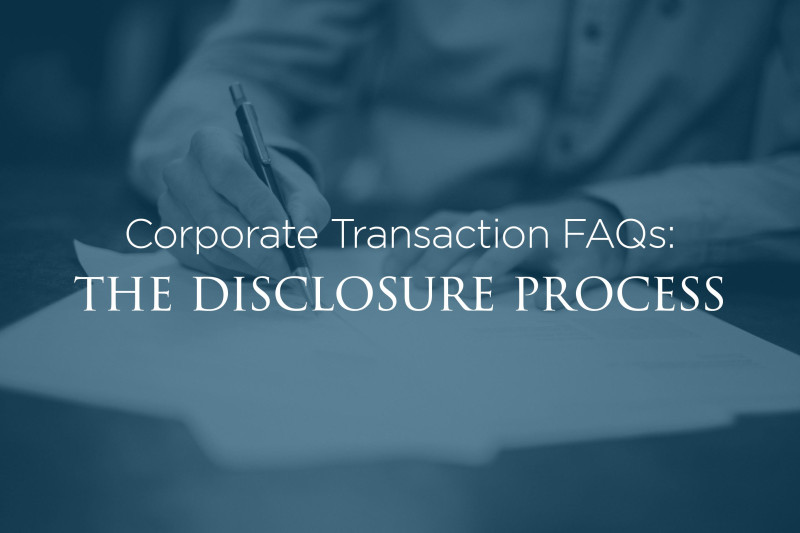Corporate Transactions FAQs - The Disclosure Process

When the time finally comes to sell your business, most of the ‘glitz and glamour’ of a corporate transaction will make its presence known early. Dozens of ‘back-and-forths’ over the sale price, difficult negotiations over the distribution of assets – all to form that important document of consensus; the Heads of Terms.
Once the terms have been agreed, it can feel like completion of your transaction is just a stone’s throw away. As such, sellers can be forgiven for feeling a sense of frustration when they find themselves up to their neck in disclosure a month later – particularly so if their lawyers have been keeping them in the dark about the process!
Disclosure is a complex and, if done properly, time-consuming process, and for those traversing it for the first time, it can at times feel never-ending.
At Leathes Prior Solicitors, we have had all manner of questions thrown at us during the process, which has helped in our understanding of the process from the seller’s perspective. Below are some of the most frequent of these questions:
What actually happens during the ‘disclosure’ process?
The disclosure process can start soon after your buyer’s lawyers produce the sale contract (which your solicitor may refer to as the ‘SPA’, or the ‘APA’). Towards the back end of this contract, there will be a long list (often spanning tens of pages) entitled ‘warranties’, which kick off the disclosure process.
Often, disclosure begins with a meeting, which will start with your solicitor explaining what you need to do. What will ensue at the meeting is a run through of each and every ‘warranty’, where your solicitor will ask you a number of questions and make notes from your answers before going away to produce what is referred to as the ‘Disclosure Letter’.
Your solicitor will likely ask you further questions after the meeting, but otherwise produce a fairly sizeable letter to be sent to your buyer’s solicitors.
Sadly, this is not quite the end of the road, and negotiating the disclosure letter can often take as much time, if not more, as preparing it. The letter moves back and forth between buyer and seller until finally in an agreed state, at which point disclosure is deemed to be agreed.
What are these ‘warranties’, and what does ‘disclosure’ actually do?
As touched on above, the gears can begin to turn on the disclosure process as soon as the ‘warranties’ are prepared.
A warranty is essentially just a legal statement of fact. For example, by warranting to me that you are the only shareholder in your company, I can hold you liable for ‘breach of warranty’ if there turns out to be another shareholder in your company.
Warranties are made for two reasons. The secondary reason is so that the buyer can sue you if they are not true, which is very rare. The primary reason is to prompt you, as the seller, to disclose against the warranties.
It is obvious why a buyer would want you to disclose things about your business. After all, they are buying it, and so would of course want to know as much about it as possible prior to completion. It is less obvious why you, as the seller, would want to disclose things about your business (other than just to be nice).
The reason is this – in most corporate transactions, you cannot be sued for something you have disclosed.
Let’s say a warranty reads that “your company has never been sued”, but you know you were sued two years ago. By disclosing what happened two years ago, you are effectively changing the warranty to “my company has never been sued except the time we were sued two years ago”.
Disclosing, therefore, restricts what you can be sued for – and the more you validly disclose, the less you can be held liable for.
What happens if I don’t want to disclose something?
Despite the above, there is rarely a seller who is all too happy to disclose anything and everything the buyer asks for.
This can be for a number of reasons, whether it be because they want to keep certain things private so as not to hurt the deal, or because it would simply be too much work to disclose absolutely everything.
There is clearly a balance to be struck. Disclose too much, and the deal could take forever. Disclose too little, and not only will the buyer become suspicious, but you could be sued for items you fail to disclose.
To strike a balance, not only will you need a corporate lawyer with a wealth of experience behind them, but with the negotiation skills to keep disclosures reasonable whilst keeping the deal alive and moving.
Our corporate solicitors at Leathes Prior range from seasoned veterans to laborious juniors – meaning not only do we have the experience to navigate through even the most intricate of disclosure exercises, but our lawyers remember how complex the process can seem first time around, and so will be on hand to answer any questions you might have.
If your business is sale-ready, and you would like an estimate of our fees to get your transaction over the line, you can contact our Corporate Team on 01603 610911, or at info@leathesprior.co.uk.


